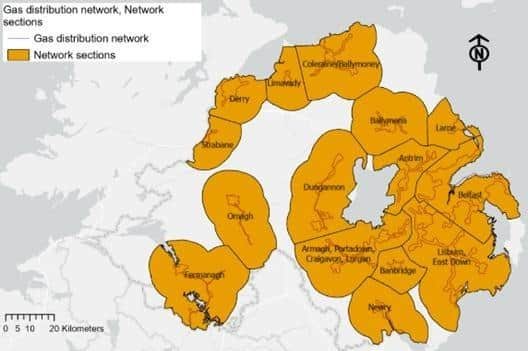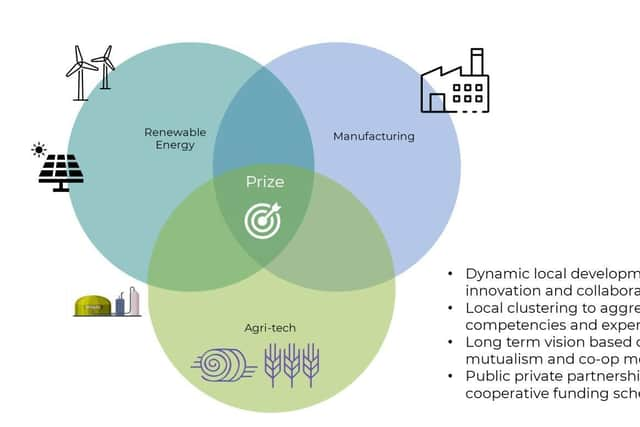Northern Ireland earmarked for transformative Agri-Energy investment opportunity
and live on Freeview channel 276
Climate change and sustainability are of major importance to Northern Ireland and farming.
Economically viable and pragmatic decisions need to be made.
Advertisement
Advertisement
The Centre for Advanced Sustainable Energy (CASE) has been leading the debate. It hosted the NI Energy Summit in June 2023 and, subsequently, wrote the seminal report: ‘Pathway to our Renewable Future’.


As a direct outcome of CASE’s work it has been approached by a number of international finance organisations interested in developing several farm waste-to-energy and green industry centres across Northern Ireland, representing a potential £multi-billion investment.
If given the ‘green light’, the projects have the potential to displace 83% of our fossil gas imports with biomethane produced by the anaerobic digestion of waste streams, supplied by the local farming and food sectors.
“Once fully operational, a project of this scale could be worth £4 billion to Northern
Advertisement
Advertisement
Ireland’s economy on an annual basis,” confirmed Ian Marshall, from CASE


“This figure is based on the significant reduction in fossil fuel imports achieved while, at the same time, switching to the use of sustainably produced biomethane from our own local resources.”
He added: “This is a win: win scenario. It would be good for the environment and good for the economy in equal measure.”
According to the former Ulster Farmers’ Union president, the development of a biomethane sector, driven by anaerobic digestion technologies is an obvious way forward for both Northern Ireland’s farming and energy sectors.
Advertisement
Advertisement
“But we need a comprehensive and co-ordinated buy-in from both the departments of agriculture and the economy,” he added.
“Given the current existence of a natural gas pipe line in Northern Ireland, a significant proportion of the infrastructure required to ensure the secure supply of biomethane from County Antrim to County Fermanagh is already in place.”
Turn to page 14
“This objective can be best met through the development of suitably structured public:private partnerships.
“Decarbonisation is the process that links the needs of the agriculture and energy sectors.”
Advertisement
Advertisement
According to Ian Marshall, anaerobic digestion enables the productive use of waste to generate renewable energy, valuable agricultural products, and nutrient recovery.
“With scale, complementary outputs help improve project feasibility and impact and can deliver a profitable business model in the absence of subsidy,” he commented.
“Utilising slurries and waste streams avoids creating competition for land between food production and energy production.”
At the heart of the project currently envisaged by CASE will be the development of centralised a biorefinery.
Advertisement
Advertisement
Ian Marshall again: "By centralising the model in public private partnerships, as part of a strategic plan, everyone can benefit.
“Such an approach will deliver opportunities for farmers, the environment, and civic society
“All farmers can benefit from a centralised model rather than just those who can afford AD.”
He continued: “High value job creation for the rural economy will be at the heart of this approach
Advertisement
Advertisement
“It will also create business and wealth generation across the entire province.
“The centralised model will also address the challenge of nutrients ending up in
watercourses and ongoing concerns regarding the environmental health of Lough Neagh.
“Significantly, this approach will drive additional revenue streams on farms to insulate businesses from commodity price volatility and protect the rural economy.
Advertisement
Advertisement
“It will deliver carbon credits while validating farmers’ actions to ensure they can continue to farm.”
Ian Marshall concluded: “We will see agriculture being used to help decarbonise the public sector, the economy, and Northern Ireland.
“And, of course the envisaged project will address the challenge of energy security and sustainability by delivering locally produced, sustainable energy, thereby removing future energy price volatility and reliance on others for supply.”
Biogas is a mix of methane, carbon dioxide and other gases produced from the anaerobic digestion process. It can be used to generate electricity and heat on-site or cleaned up to renewable natural gas standards for grid injection.
Advertisement
Advertisement
Energy production aside, the members of the CASE team foresee large scale AD delivering a number of other valuable outputs. These include:
Carbon dioxide: used extensively in food production, food packaging, and in abattoirs. It is a commodity that is often in short supply.
Digestate: the material leftover after digestion is called digestate. This nutrient-rich material makes an excellent agricultural fertilizer and soil amendment, providing valuable organic matter and nutrients like nitrogen, phosphorus and potassium.
Biochar: it is produced by pyrolysing digestate for use as a soil conditioner or blended for other purposes. When mixed with cement, for example, biochar can be used to produce carbon neutral building materials.
Advertisement
Advertisement
Bio-fertiliser: the liquid fractions of digestate can be processed into concentrated liquid bio-fertilisers for application on crops. This provides nutrients and beneficial microbes.
Compost: the solid fractions of the digestate can be composted and sold as a soil
conditioner and organic compost product.
Transport fuel: upgraded biogas that is refined to renewable compressed natural gas (CNG) can be used as a transport fuel for fleets of gas-powered vehicles, displacing diesel and gasoline.
Precipitated phosphate: struvite, or precipitated phosphate, can be recovered from digestate as a phosphorus-rich fertilizer.
Advertisement
Advertisement
Renewable credits: the renewable energy from biogas may qualify for renewable energy certificates, carbon credits or green tags that have market value.
The Centre for Advanced Sustainable Energy (CASE) is an industry-led sustainable energy research centre.
Set up through the Invest Northern Ireland Competence Centre programme CASE supports collaboration between academia and industry, aiming to transform the sustainable energy sector through business research. CASE is a collaboration between Queens University Belfast, Ulster University, AFBI, and INI, hosted in Queens, and funded by DfE.